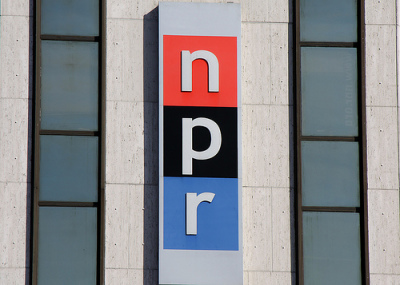Terry Gross' Anti-Christian Crusade

Terry Gross, the host of NPR's Fresh Air, has been taking advantage of the good weather during the summer months to wage a war on Christianity. We will see whether the assault slows down for winter, but I am writing just days before the official start of autumn and there is no sign of any change of tactics yet. Today (18 September) it was an interview with Linda Kay Klein, the author of Pure: Inside the Evangelical Movement that Shamed a Generation of Women and How I Broke Free.
In truth, however, every time Gross addresses evangelicalism, the theme is: I once was a conservative Christian, realized the movement was sinister and oppressive, and now I'm an ex-evangelical who has broken free. I have a day job and do not listen to Fresh Air regularly, so I am not able to provide an exhaustive list. Highlights, however, include the episodes on The Miseducation of Cameron Post (18 and 25 July) which were about how evangelicalism is sinisterly wrong and oppressive. Michael Arceneaux's I Can't Date Jesus a few days earlier (23 July), on the other hand, was about how conservative Christianity is sinisterly wrong and oppressive. A week and a half before that it was another breaking free story: "An Evangelical Minister's Change of Heart on Abortion" (11 July). To come back closer to the present, 14 August was on Karen Piper's memoir, A Girl's Guide to Missiles. Gross found the escaping-evangelicalism part of her story particularly worth probing.
Imagine if the only people who were ever allowed to discuss living in Iowa on NPR were people who grew up there, found the place stifling and toxic, and left angrily, determined never to return. That is what it is like to listen to Terry Gross on Christianity. Admittedly, the one that got away was an opening skirmish in this summer's campaign: her interview on the film First Reformed with its director, Paul Schrader (12 June). Gross was under the impression that Schrader was an ex-Christian and was excited to settle into a good, old-fashioned, breaking-free-from-religion narrative. Schrader dutifully explained that he had once been a member of a Christian Reformed Church but that he is now a Presbyterian. Let's just say that going from one Calvinist denomination to another was not exactly the tale of liberation the presenter was hoping for.
Part of the compelling nature of Gross's work is her sympathetic style. She talks to people about the phase of their life when they were a drug dealer, or sex worker, or enforcer for the mob, or whatever without the least hint of judgment in her voice. She is just all curiosity and openness blended with a certain urbane knowingness regarding the many ways that people get through life. But Schrader and his co-guest, the star of First Reformed, Ethan Hawke, were just too much. Gross was noticeably uncomfortable with how comfortable they were with their Christianity. She even wondered aloud if asking people what church they go to is too personal a question. This is strange on more than one front. First, when does Terry Gross ever worry about a question being too personal? Second, how could someone not know that going to church is a public act not a secret fact? For all her visceral dislike of evangelicalism, it is not even clear that Gross knows what it is. Today she kept referring to leaving "the Evangelical Church" as if it were an organization rather than movement. Does Gross grasp that, for instance, a local Episcopal or United Methodist congregation might happen to be evangelical?
Fresh Air, although it defaults to artists and entertainers, seems to cover all of human life – leaders in politics, science, technology, business, activism, and so on. The one exception is faith leaders. When did Terry Gross ever interview a Christian leader who was there to represent rather than criticize their faith community? Indeed, Fresh Air somehow never manages to interview anyone who is a current, content member of any expression of historic or traditional Christianity. (Schrader was the exception that proved the rule.) Evangelical identity is only operationalized on NPR if it seems to be furthering some threatening political or social agenda. Waves upon waves of evangelicals – often literally in church vans – show up, for instance, after hurricanes to do disaster relief, but it would never occur to anyone at NPR to identify them as evangelicals or to make the connection between their activism and their faith. Gross was particularly baffled by Hawke's fond memories of going on mission trips with his church youth group. Gross knows that "missions" are a bad thing, but Hawke was not describing something that sounded sinisterly wrong and oppressive but rather kind, helpful, and benign. Evangelicals as evangelicals simply do not exist unless they are being caught in the act of doing something presumed to be harmful.
The evangelical community in America is so large that NPR is confident that it can swing national elections. Yet, in all seriousness, I ask: does a single evangelical work for NPR? Does Terry Gross know well even one evangelical? Maybe it is time to let in some fresh air.




























